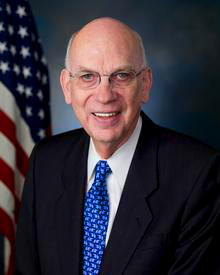Former United States Senator Bob Bennett passed away May 4, from complications relating to pancreatic cancer and a recent stroke according to a statement released by his family.
Bennett served three terms in the Senate, from 1992 to 2010. Before his time in national politics, he was a student at the U. He served as freshman class president, then referred to as “frosh prexy”, according to articles in The Daily Utah Chronicle from 1951, and as student body president. Bennett was the subject of more than a few articles in the Chronicle during his time as a student.
In addition to student politics, Bennett was a successful debater and even acted in a production of Tom Thumb. An article written in 1953 details one particular time he participated in an oration competition with a speech on power struggles within Russia. A few hours before the first round of the competition, Joseph Stalin died and Bennett had to revise considerably. A few minutes before the second round, Georgy Malenkov was appointed as Russia’s premier and Bennett was forced to revise his oration again. He still tied for second place in the competition.
Besides being popular material for Chronicle articles during his time at the U, Bennett also wrote articles. Frequently, he wrote in a weekly column called “Today’s Trend” from 1952-1953, where he discussed campus, local, state, and federal politics.
Bennett covered a presidential election, speeches in Utah by top politicians, and Utah’s sweeping switch from Democratic to Republican for the first time in 28 years. He celebrated the closing of “one of the widest rifts ever sustained by the ‘Grand Old Party’ since it took that label” and praised government officials who could work together, despite bitter differences of opinion, for the good of the country. His predictions were often correct. His conservative political leanings were evident, but never in a way that obscured fact or suggested only his school of thought could be correct. Bennett’s political analysis often found the deep import in seemingly unimportant political events.
Among other, more mundane articles about life at the U, Bennett’s articles are gems now, whether or not you agree with his opinions. Even at the time, they were well read enough to attract letters to the editor. He “[lifted his] journalistic lance to joust” with foes several times, stating that “[he] could not write anything [he] considered to be false” while also recognizing that others could have different opinions.
Bennett decried rumors that he ever wrote acting as a mouthpiece for some other person or group. “I have my own mouth, thanks, and don’t have to act as someone else’s,” Bennett said. He also alluded to instances in which he wrote his opinions despite discouragement from family or friends. He believed wholly in what he wrote.
Given the quality of Bennett’s political writings during his time in college, becoming such an experienced senator is no surprise. Bennett’s stories show he was a bright political mind and highly engaged in the community from very early on. After his death, President Barack Obama released a press statement through the White House offering his condolences and celebrating the way in which Bennett’s “commitment to his constituents transcended partisanship and he often reached across the aisle to get things done. He was a dedicated public servant and his work– like efforts to save the country from economic collapse– is exemplary of what we can accomplish when we put aside our differences and focus on our common goals.”
Bennett’s viewing and funeral were held on May 14, according to his family’s statement, and he was interred at the Salt Lake City Cemetery.


